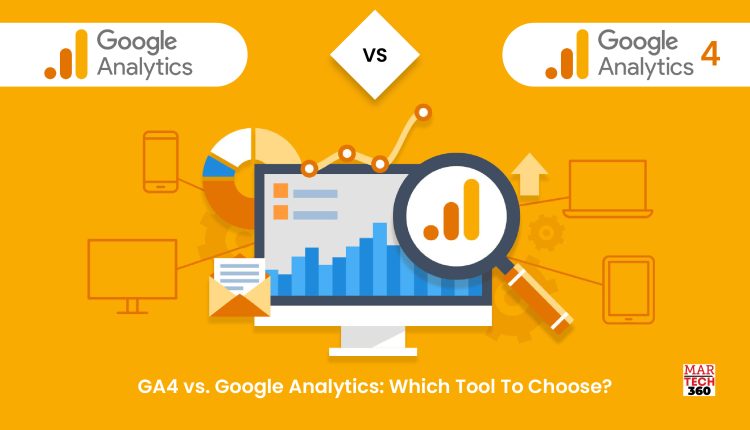“GA4 vs. Google Analytics: Which is better?” This has been a question that has popped up in marketers’ minds ever since its launch announcement. Google Analytics (GA), popularly known as Universal Analytics or GA3, was initially launched in 2005 as “Urchin”. What followed next was the Universal Analytics (UA) platform in 2012 which emerged as the standard for tracking as an upgrade to Google Analytics.
Google Analytics, being the original web analytics service provided by Google, was featured with additional features and capabilities helping businesses track the number of new visits on your website, the number of unique users landing on the page, the time period users stayed on the page and multiple more.
Google Analytics is considered one of the leading web analytics services in the world. According to BuiltWith, there are a whopping 28 million websites that are currently using Google Analytics to gain insights into their audience and improve the performance of their website.
Let’s take a closer look into the debate of GA4 vs. Google Analytics and find out the answers for the same so that you can choose which version will help you reach your business goals.
Google Analytics vs. GA4: A Complete Guide
On October 14, 2020, Google launched the latest version of its web analytics service, called Google Analytics 4 (GA4). This version is a significant upgrade from the previous version, Universal Analytics, and comes with a range of new functionalities and features. These include machine learning-based insights, enhanced cross-device, and cross-platform tracking, and improved event tracking.
Google Analytics and GA4 are two analytics platforms offered by Google that allow website owners and marketers to monitor and analyze website traffic and user behavior for the purpose of improving website performance and user experience. Although they share the same goal, there are significant variations between the two platforms that website owners need to be familiar with.
 GA is a highly utilized and firmly established analytics platform that provides abundant data and insights. It is still being supported and will receive continuous updates and fixes. On the other hand, GA4 is the newest version of Google Analytics, offering advanced features and abilities while also having a more privacy-focused approach to data collection.
GA is a highly utilized and firmly established analytics platform that provides abundant data and insights. It is still being supported and will receive continuous updates and fixes. On the other hand, GA4 is the newest version of Google Analytics, offering advanced features and abilities while also having a more privacy-focused approach to data collection.
Hence, website owners seeking to remain at the forefront of the industry and exploit the latest features and capabilities should contemplate transitioning to GA4. The choice between GA and GA4 depends on the individual requirements and objectives of the website owner.
Also Read: Bard vs. ChatGPT: Who will win the Coversational AI Race?
GA4 vs. Google Analytics: Key Differences
GA4 and Google Analytics have several key differences in terms of data collection, reporting, and features. Let’s dive into the key differences these two platforms denote:
Event Tracking
Compared to Google Analytics, GA4 offers greater flexibility and control over event tracking. Website owners can define custom events and parameters to track specific user interactions, such as form submissions, button clicks, and video plays, making it easier to gain insights into user behavior and identify opportunities for optimization.
Calculations Methodology
GA4 incorporates machine learning technology to deliver more sophisticated insights into user behavior. It can automatically detect and group users based on their interests or behaviors and provide detailed information about how different user segments interact with a website or app. This enables website owners to make informed, data-driven decisions about how to optimize their sites for different audiences.
Cross-Platform Capabilities
GA4 provides enhanced cross-platform tracking capabilities that allow website owners to track user behavior across multiple devices and platforms, including web browsers and mobile apps. This provides a more comprehensive picture of user behavior and enables website owners to optimize their site for users on different devices.
Data Model
The data model of GA4 is based on user events, meaning that data is categorized according to specific actions or events undertaken by users, such as clicks, page views, and conversions. This approach facilitates cross-platform and cross-device tracking, as well as customization and more effective data analysis.
Ease of Usage & User-Friendliness
GA4 features a new user interface that is designed to be more intuitive and user-friendly than Google Analytics. It includes a customizable dashboard that enables website owners to quickly access important data and insights, as well as new visualization tools that facilitate the interpretation of complex data.
GA4 vs. Google Analytics: Data Collection & Privacy Concerns?
Continuing our complete guide of GA4 vs. Google Analytics, what we tend to tackle next is what the data collection approach and privacy concerns are for both these platforms. Let’s peek into this aspect and understand the nooks and crannies of the tools:
The data collection approach of GA4 is more privacy-focused compared to the previous version of Google Analytics. The data model is event-based and allows users to have better control over their data. This new model, powered by App + Web technology, enables website owners to measure user interactions across websites and mobile apps, and share data with Google Ads for better advertising results.
On the other hand, Google Analytics uses cookies to track user behavior, which could raise privacy concerns. Google has provided website owners with tools to customize data collection settings allow users to opt out of tracking, and ensure that data is stored securely.
Regardless of the platform used, website owners must comply with applicable laws and regulations such as General Data Protection Regulation (GDPR) and California Consumer Privacy Act (CCPA) regarding data collection and use practices.
Who Wins the Debate of GA4 vs. Google Analytics?
Google Analytics 4 (GA4) is a significant improvement over Google Analytics, offering website owners advanced features and capabilities that provide deeper insights into user behavior and facilitate website optimization. While it may take some time for website owners to become familiar with the new interface and functions, the advantages of adopting GA4 are considerable and can lead to enhancements in website performance and user experience.
The decision of whether to use GA4 or Google Analytics depends on the specific needs and objectives of the website owner. However, GA4 represents a significant improvement over the previous version of Google Analytics and is considered the future of the platform. Its advanced features, such as machine learning-based insights, customizable event tracking, and enhanced cross-platform tracking, enable it to be a more attractive option for website owners.
Additionally, GA4 boasts a new data model that enables website owners to track and analyze data from different sources, such as websites, mobile apps, and other digital platforms. While Google will continue to support and update Universal Analytics, it encourages website owners to switch to GA4 to enjoy its new features and capabilities.
To summarize, GA4’s event-based data model provides more flexibility and customization options for data analysis, and its user-friendly interface is much more intuitive. Despite its widespread use and continued support, Google Analytics may not receive updates and improvements in the future, making GA4 a more appealing option for those seeking the latest features and capabilities.



Comments are closed.